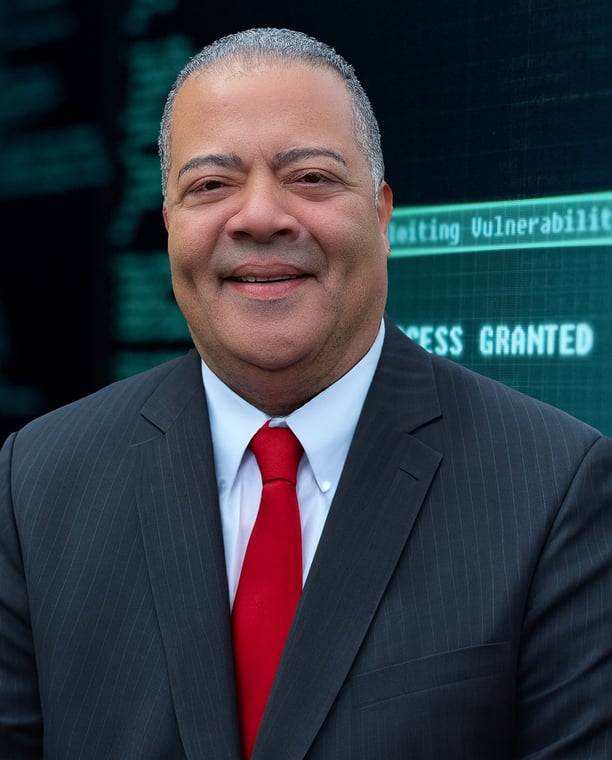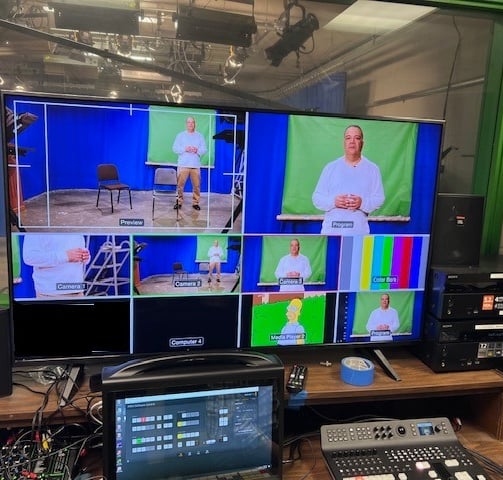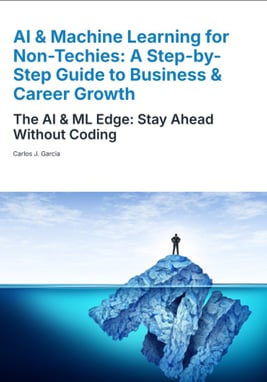Welcome to Professor Garcia's Academic Website
Advancing Education in Cybersecurity, AI, and Networking
About Professor Garcia
Professor Carlos J. Garcia brings a unique blend of experience to his roles in higher education. Currently serving as Assistant Professor of Cybersecurity at SUNY Westchester Community College and Adjunct Professor focusing on AI at the City College of New York, his professional journey has spanned technical instruction, law enforcement, and military service. This diverse background provides a comprehensive perspective that informs both his teaching and approach to technology.
His path includes pivotal moments like spearheading the development of K12 cybersecurity education in Michigan and adapting his focus to address the emerging importance of Artificial Intelligence education. Professor Garcia holds a Master of Science in Information Assurance from Eastern Michigan University and a Bachelor of Arts in Criminal Justice Administration from Concordia University, alongside credentials in Law Enforcement and as a Business Computer Technician. His career reflects a consistent dedication to advancing knowledge and practical skills in critical technology fields.






Meet Professor Garcia
Driven by a passion for making cutting-edge technology education accessible, Professor Garcia is an advocate for practical learning and responsible innovation. His unique perspective is shaped by a diverse career path blending deep technical instruction in cybersecurity and AI with real-world experience in law enforcement and the military. He is dedicated to empowering students at all levels – from pioneering K12 cybersecurity programs to shaping the discourse on ethical AI – always focused on helping learners develop their skills and authentic voice in a changing world.


Philosophy
Professor Garcia's educational philosophy prioritizes bridging theoretical concepts with intensive, hands-on application. He believes in empowering students with practical, job-ready skills through methodologies that emphasize real-world tools, virtualized lab environments, and competency-based learning across various delivery formats including face-to-face, hybrid, and asynchronous online instruction.
His approach to research and teaching involves critically examining effective pedagogies for technical subjects and exploring the ethical, practical integration of emerging technologies like Artificial Intelligence. A core tenet is fostering responsible technology use while guiding students to develop their authentic voice and critical thinking abilities in the digital age – adapting educational strategies as technology evolves. Insights drawn from his unique background in technology, public service, and military leadership inform his emphasis on security, systems thinking, and the importance of ethical frameworks.
Accomplishments
Pioneered K12 Cybersecurity Education in Michigan: Conceived and implemented the state's first high school cybersecurity program (2015). This landmark project involved creating state-wide curriculum standards, designing lab specifications, and establishing teacher training programs, ultimately expanding cybersecurity education to thousands of students across dozens of school districts statewide.
Shaped National & State Cyber Education Policy: Contributed to educational frameworks as Co-Chair of the National Initiative for Cybersecurity Education (NICE) K12 Education Committee and Co-Founder of the Michigan Initiative for Cybersecurity Education (MICE).
Advanced AI Education Initiatives: Designed and delivered foundational AI courses at the City College of New York; frequently presents at academic and professional conferences on AI ethics, cybersecurity integration, and pedagogy in the age of AI. Contributed to the White House's National Cyber Workforce and Education Strategy development.
Held Key Leadership & Administrative Roles: Served as Cybersecurity Program Lead (Jackson College), Senior Manager of Technical Instruction (Per Scholas), and Administrator for Cisco, Microsoft IT, and VMWare Academies (LISD TECH Center).
Extensive Curriculum & Program Development: Created and managed comprehensive programs and curricula across multiple institutions and educational levels in cybersecurity, networking, digital forensics, and IT.
Notable Presentations & Publications: Delivered numerous presentations at key conferences (NICE K12, NYCLSA, Michigan Cyber Summit, etc.). Explored AI applications in academic writing through contributions to an AI-assisted ebook project.
Distinguished Military Service: Retired as a Sergeant First Class (E7) from the U.S. Army Military Police Corps after decorated service, including deployment during Operation Iraqi Freedom.


Academic Projects
Showcasing research and teaching initiatives by Professor Garcia.


Research Focus
Exploring innovative methodologies in academic research and teaching.
Professor Garcia's research interests center on enhancing technical education through effective pedagogy and the practical application of emerging technologies. Key areas include:
Developing and evaluating hands-on, competency-based learning models for cybersecurity, networking, and AI.
Investigating the ethical integration and pedagogical best practices for Artificial Intelligence within academic settings.
Exploring strategies for creating clear K-20 educational pathways in technology fields, particularly for underserved populations.
Analyzing the intersection of technology with public safety and the implications for digital forensics and cybersecurity frameworks.


Publications
Highlighting key publications and contributions to the field.
Ebooks (AI-Assisted):
AI & Machine Learning for Non-Techies: A Step-by-Step Guide to Business & Career Growth
Selected Presentations:
"How to Help Student Develop Their Authentic Voice in a World of AI," New York College Learning Skills Association (June 2024)
"Cybersecurity in the Age of Artificial Intelligence," Westchester Community College Staff Development (March 2024)
"Best Use of AI/ChatGPT for Learning Skills Professionals," New York College Learning Skills Association (Nov 2023)
Contributor, National Cyber Workforce and Education Strategy Table Read, Office of the National Cyber Director, Executive Office of the President (March 2023)
Multiple presentations and panel discussions at National NICE K12 Cybersecurity Education Conferences on state initiatives, pathways, and educator perspectives (2015, 2016, 2017).
Panelist, Governor's Michigan Cyber Summit on Cybersecurity Education (2013).




Teaching Methods
Engaging students through diverse and effective teaching strategies.
Professor Garcia employs a variety of teaching methods designed to foster deep understanding and practical skill acquisition:
Hands-On Labs: Extensive use of virtualized environments (VMWare, VirtualBox, Proxmox) and physical hardware for practical exercises that mimic real-world scenarios.
Industry-Relevant Tools: Incorporating standard tools like Cisco Packet Tracer, Wireshark, AccessData FTK, EnCase, Kali Linux, and various Windows/Linux server environments.
Flexible Delivery: Experience designing and delivering courses effectively across face-to-face, hybrid, and fully asynchronous online formats using various Learning Management Systems (Canvas, Blackboard, Brightspace, etc.).
Competency-Based Elements: Integrating competency-based and project-based learning approaches to allow students to progress as they master skills.
Certification Alignment: Structuring coursework to align with key industry certifications (CompTIA A+, Network+, Security+, Cisco CCNA, etc.) to provide clear career pathways.
Student Engagement: Actively advising student clubs and competition teams (CyberPatriot, Business Professionals of America, USCC Cyber Defense) to promote engagement beyond the classroom.
Collaborations
Partnering with institutions for impactful academic projects.
Professor Garcia actively collaborates with various organizations to enhance technology education and create opportunities for students:
National/State Leadership: Co-Founded the Michigan Initiative for Cybersecurity Education (MICE) and served as Co-Chair for the National Initiative for Cybersecurity Education (NICE) K12 Committee, working closely with educators, policymakers, and industry partners.
Government & Policy Input: Contributed to the development of the White House's National Cyber Workforce and Education Strategy through participation in expert consultations. Collaborated with the Michigan Department of Education on K12 cybersecurity standards.
Inter-Institutional Partnerships: Developed articulation agreements and pathways between high schools, community colleges, and universities (e.g., LISD TECH Center, Jackson College, Washtenaw Community College, Eastern Michigan University) to create seamless K20 educational ladders.
Grant Participation: Participated in the Department of Defense "Dreams to Reality" grant focused on instructing under-represented students in Information Assurance at Eastern Michigan University.
Industry & Community Engagement: Maintains connections with industry partners (e.g., through Infragard) and engages with community organizations to promote technology awareness and education.
→
→
→
→



Contact Me
Feel free to reach out for inquiries or collaborations.
Connect
Reach out for inquiries or collaborations.
Explore
© 2025. All rights reserved.